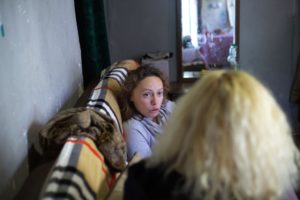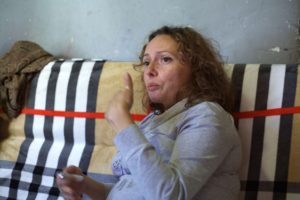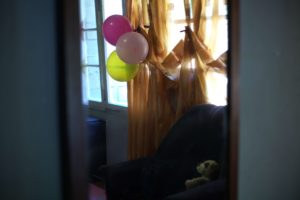 Author: Irma Kahurashvili, Georgia
Author: Irma Kahurashvili, Georgia
Tamar owns a small house in Tbilisi. We are sitting in a tiny room of this house, decorated with colourful balloons from a children’s celebration. All the doors are wide open and the scent of lilacs reaches us from the green courtyard. Tamo talks about her troubled life – three children and imprisonment, work and HIV that she has been living with for several years.
Tamar Gakhokidze is a social worker in NGO Gepa Plus. She helps HIV-positive people and people with drug dependency. Last year, she received the Frida and Edita Sisters Award (which honours those who work within communities at the national and international levels in Armenia, Georgia, Azerbaijan, Belarus, Moldova, Russia and Ukraine – author’s remark) for leadership in social activism that improves the quality of life of key population groups and inspires other people to be socially active.
Outside the ARV Medications Access Zone
In 2004, Tamo was imprisoned in a female prison colony after she had a fight with her tipsy husband and inadvertently deprived him of life. This tragedy has changed her whole life. After four years in prison, she learned that she was HIV-positive. An employee of Tanadgoma Center for Information and Counseling on Reproductive Health brought the result of the HIV test to the colony. Tamo first thought it was a prank. She simply could not believe it, and when asked once again if she understood what her diagnosis was, she answered clearly: “No!” The doctor told Tamo that she could keep her health condition secret, but she decided not to hide it.
What exactly happened, how and where she contracted the disease – these thoughts were constantly in her head. In the female prison colony, there were two instances when Tamo had the risk of being infected: when either her appendicitis or tooth was removed in the prison hospital. Tamo believes that the infection was caused by the negligence of a doctor who used non-sterile medical instruments.
Sometime later, Tamo asked the prison dentist to give her a separate box, where her personal medical instruments would be stored.
 “In this way, I was protected from the other women. I was calmer that way because I knew for sure that others could be in my place. I would not leave the doctor’s office until he sterilized my tools,” the woman says.
“In this way, I was protected from the other women. I was calmer that way because I knew for sure that others could be in my place. I would not leave the doctor’s office until he sterilized my tools,” the woman says.
Back then, there were more than 1,500 women in the colony. After Tamo had announced that she was HIV-positive, women started avoiding her. Doctors were also afraid: the dentist refused to provide her with treatment, and another doctor whom she asked for vitamins, replied that she was not supposed to approach him. Discrimination continued outside the prison when Tamo gave birth to her child. She was also not very lucky with employers since everyone knew that Tamar was a former prisoner and that she had health issues.
Despite the obstacles, Tamo became one of the first women in Georgia who openly informed everyone that she was living with HIV. She urged HIV-positive women not to be afraid to give birth, talked about the fact that these women could still have healthy children, and she was an example herself thereof. Tamar gave birth to two healthy children already being HIV-positive.
Solving the problems means speaking up about them
Having spent eight years in prison, Tamo wants to figure out what actually happened to her.
“I have collected all the necessary documents, and I want to go to court and find out the truth about why I was deliberately deprived of medical help, even though I got infected in prison without any fault of my own? I remember after I had broken my leg, a telephoned message and commission took place, and even the investigators arrived immediately due to this simple reason. Then why no one paid attention to me when there was a real threat to my life?” the woman asks.

According to Tamo, at that time everyone who had a CD4 level below 350 cells had to receive treatment. She never did. The woman shows her medical form, where it is indicated that she had both a crisis and low CD4 indicators – 51, 90, 106, 136 …
Now Tamo is confident that the HIV-positive community will be able to solve any problems if they openly speak about them.
“I have zero viral load. I live my life just like everyone else does, and I want to live on further,” she says.
Tamar recalls that she did not give up even when she was afraid of her status.
“I cried every day and it seemed to me that maybe those were the last hours of my life. There was no one by my side who could just talk and comfort me, but I overcame everything. I dreamed to see the lilacs in my courtyard, and now not only I do see them, but I also smell their aroma. Also, my beloved children, parents and friends are with me!” says Tamo.



